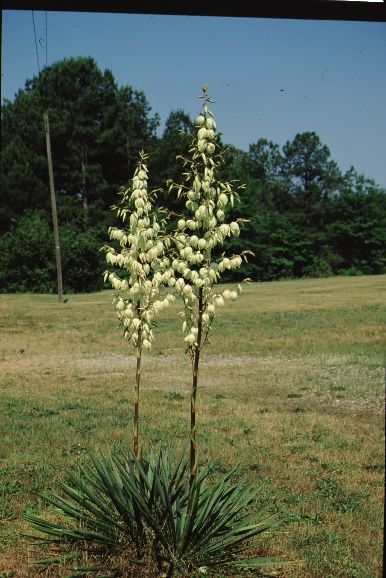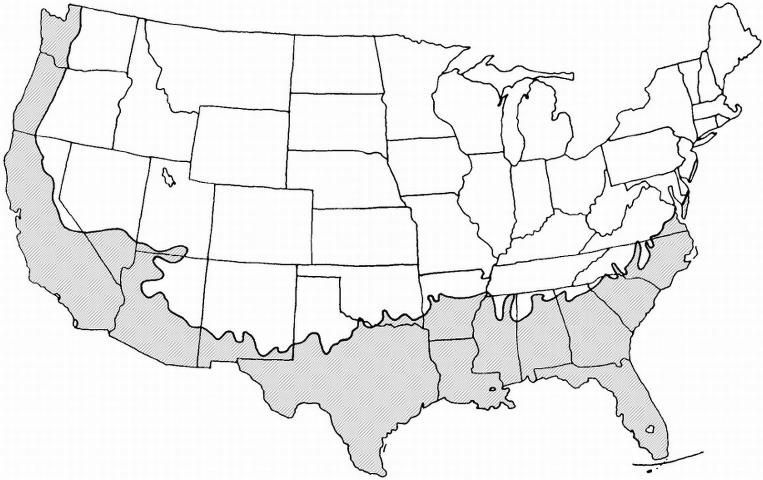Introduction
Adam's needle is a slow-growing native plant found scattered through the woods in the southeastern United States. Leaves appear as though they have been shaved because leaf margins bear curved, filamentous threads of leaf tissue. The leaf terminates in a sharp spine. Plants stay small, growing no more than about 3 feet tall. In summer a tall, showy flower spike emerges from the center of the plant and displays prominently for several weeks.

Credit: Edward F. Gilman, UF/IFAS
General Information
Scientific name: Yucca filamentosa
Pronunciation: YUCK-kuh fill-luh-men-TOE-suh
Common name(s): Adam's needle
Family: Agavaceae
Plant type: shrub
USDA hardiness zones: 7B through 10 (Figure 2)
Planting month for zone 7: year round
Planting month for zone 8: year round
Planting month for zone 9: year round
Planting month for zone 10: year round
Origin: native to Florida
Invasive potential: not known to be invasive
Uses: specimen; naturalizing; border; accent; attracts butterflies
Availability: somewhat available, may have to go out of the region to find the plant

Credit:
Description
Height: 3 to 15 feet
Spread: 3 to 4 feet
Plant habit: round
Plant density: moderate
Growth rate: slow
Texture: coarse
Foliage
Leaf arrangement: alternate
Leaf type: simple
Leaf margin: terminal spine
Leaf shape: linear
Leaf venation: parallel
Leaf type and persistence: evergreen
Leaf blade length: 12 to 18 inches
Leaf color: green
Fall color: no fall color change
Fall characteristic: not showy
Flower
Flower color: white
Flower characteristic: spring flowering
Fruit
Fruit shape: oval
Fruit length: 1 to 3 inches
Fruit cover: dry or hard
Fruit color: brown
Fruit characteristic: suited for human consumption
Trunk and Branches
Trunk/bark/branches: usually with one stem/trunk; not particularly showy
Current year stem/twig color: green
Current year stem/twig thickness: very thick
Culture
Light requirement: plant grows in part shade/part sun; plant grows in the shade
Soil tolerances: alkaline; sand; acidic; loam
Drought tolerance: high
Soil salt tolerances: good
Plant spacing: 36 to 60 inches
Other
Roots: not applicable
Winter interest: no special winter interest
Outstanding plant: plant has outstanding ornamental features and could be planted more
Pest resistance: no serious pests are normally seen on the plant
Use and Management
Adam's needle can be used as a specimen to accent an area in the landscape. Its striking texture will draw attention. It has also been planted in mass on 3- to-4-foot centers to form a ground cover effect. Locate the plant 3 to 4 feet back from the edge of a walk or patio to prevent getting injured from the spine at the tip of the leaves.
Adam's needle grows in its native habitat in well drained soils in mostly sunny locations. It tolerates partial shade well, provided enough air circulates to keep the plant on the dry side.
There is a variegated cultivar called 'Variegata' that has light yellow stripes along the margins.
Pests and Diseases
No serious pests affect the plant if its cultural requirements are met.